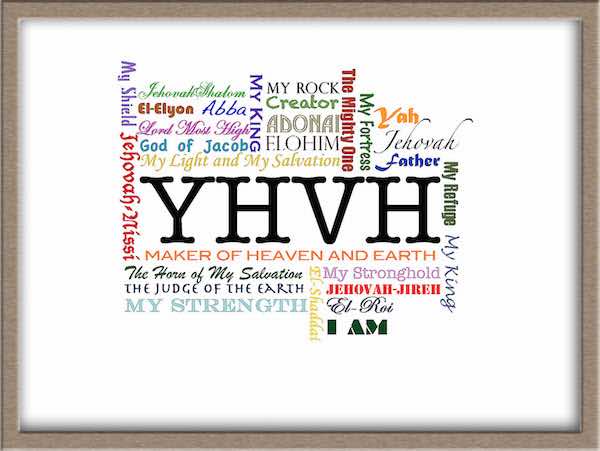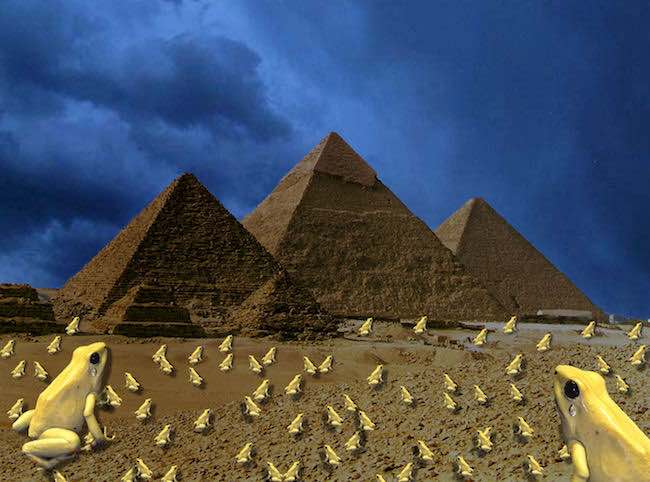Why do people not believe in God?
I was talking to a friend recently and we were talking about many different topics. At one point in our conversation my friend, whom we’ll call Zach, explained to me how he has worked for several famous pastors and evangelists in the past and how he saw hypocrisy in almost all of their lives, using the “ministry” to make themselves rich. I asked Zach how this has affected his perspective of God. Zach thought about it for a minute and then responded, “I don’t believe in God. I don’t believe in anything.”
I didn’t know Zach well but it made me sad to hear that his perspective of God had been so negatively affected by those who not only call themselves believers in Yeshua but supposedly live their lives for the sake of telling others about Yeshua and making disciples. There are various obstacles in life which affect how we view and understand God. Some people come to faith in God at an early age and have a life that is filled with good and godly influences. Others may have a different path filled with many obstacles which constantly hinder them from believing on and knowing God.
As we study this week’s Torah Portion we will investigate various ways by which God makes Himself known to man and the choice that man is given to respond to God.
The Name of God
In the beginning of this week’s Torah Portion (Ex. 6:2-9:35), God spoke to Moses and reminded him of who He is, “I am the LORD” (Ex. 6:2). God was again declaring to Moses, for the sake of the Israelites, the unique Name by which He had revealed Himself, the Name which is unspeakable, “יהוה” – “YHVH.” God had earlier revealed this Name to Moses when He appeared to him in the desert:
God, furthermore, said to Moses, “Thus you shall say to the sons of Israel, ‘The LORD, the God of your fathers, the God of Abraham, the God of Isaac, and the God of Jacob, has sent me to you.’ This is My name forever, and this is My memorial-name to all generations. – Ex. 3:15
This unique Name of God, “יהוה” – “YHVH” (generally spelled “LORD” in English), was to be God’s distinctive Name in relation to His people. God was revealing Himself in an intimate way to the people of Israel and He wanted them to know and trust Him:
…and I appeared to Abraham, Isaac, and Jacob, as God Almighty, but by My name, LORD, I did not make Myself known to them. – Ex. 6:3
The LORD had appeared to Abraham, Isaac, and Jacob as “El-Shadai” – “אל שדי” – “God Almighty” but He made Himself known to the Israelites by His Name “יהוה” – “YHVH” – “LORD.” God wanted Moses and Israel to clearly understand that He was the same God of their forefathers, He knew them, and He remembered them.

The Promises of God
As God continued to speak to Moses, He reminded Moses of His covenant that He had made with Abraham, Isaac, and Jacob regarding giving them the Land of Canaan (Ex. 6:4). God also told Moses that He had heard the groaning of His people under the bondage of the Egyptians and how according to His covenant He must act (Ex. 6:5). God then commanded Moses to go to the children of Israel and to proclaim to them what He was about to do:
Say, therefore, to the sons of Israel, ‘I am the LORD, and I will bring you out from under the burdens of the Egyptians, and I will deliver you from their bondage. I will also redeem you with an outstretched arm and with great judgments. Then I will take you for My people, and I will be your God; and you shall know that I am the LORD your God, who brought you out from under the burdens of the Egyptians. I will bring you to the land which I swore to give to Abraham, Isaac, and Jacob, and I will give it to you for a possession; I am the LORD.’ – Ex. 6:6-8
The promises of God to the people of Israel were so timely and complete. God had promised them deliverance, a new homeland, and a unique relationship with the God of heaven and earth. What people could resist such an offer while suffering in slavery and bondage?
The Response of the Israelites
God had given these beautiful promises to Moses to speak to the children of Israel in the name of the LORD. Moses spoke to the people as God commanded him but the people did not listen to Moses. His words fell on deaf ears because, as we read in the Bible: “they did not listen to Moses on account of their despondency and cruel bondage” (Ex. 6:9). The people were unable to hear these words of life that God was offering them through Moses.
In Hebrew, the reasons given for the Israelites not listening to Moses are “מקצר רוח ומעבדה קשה” – “mikotzer ruach uhme’avudah kashah” – “from shortness of spirit and from heavy labor.” The Israelites were under such intense bondage that it had sucked the life out of them. Their spirits were crushed and they had no strength even to believe in hope. The Israelites had experienced four hundred years of living in Egypt and the cruelty of those years had wiped out any hope of change for the better. The people couldn’t even listen to the words of Moses.
There are certain situations and experiences in life that are so devastating to the human spirit that it seems like nothing can penetrate the resulting hurt and despair. This is where the Israelites found themselves at that time. Moses had supposedly been sent by God to set them free but after Moses talked to Pharaoh the first time, the labors of the people became more difficult and their bondage more cruel (Ex. 5). The Israelites couldn’t see past their pain and suffering. They had become blind to hope and deaf to the possibility of deliverance.
The Response of Moses
The LORD then told Moses to go to Pharaoh and to tell him to let the sons of Israel leave Egypt, however, Moses began to doubt as well. Moses had already tried once to talk with Pharaoh but Pharaoh basically laughed at him and told him to stop distracting the people from their labors.
Now Moses had gone to his own people, the Israelites, and they didn’t want to listen to Moses either. Moses was losing hope and he said to God, “Behold, the sons of Israel have not listened to me; how then will Pharaoh listen to me, for I am unskilled in speech?” (Ex. 6:12). Hope for deliverance was withering away and Moses felt unable to fulfill this responsibility that God had given to him.
When All Hope is Shattered
Moses and the Israelites were in a place of complete despair with no human reason to believe that their circumstances were going to change. Moses knew the power of Pharaoh and the Egyptian military might from the inside of the palace and he had fled from it. The Israelites knew the power and oppression of their Egyptian taskmasters from the other side of the palace and were being crushed by their cruelty.
Power and evil have a way of brainwashing people into believing that there is no other way but to continue in unbearable circumstances. This is the same reason that many people today fail to believe in God. Many people have been beaten down by the evil powers of this world and hope in God seems completely out of reach for them. In circumstances like this only the miraculous power of God can break through. This is exactly what was about to take place in the land of Egypt.
Moses and the Israelites had been briefly introduced to the LORD by His Name, “יהוה” – “YHVH,” but they were about to see His power displayed on earth like nothing that they had ever seen or heard before. Their faith and hope were about to be born again!
The Display of God’s Power
God told Moses again to go to Pharaoh and to speak to him the words that He would give him, however, Moses was still hesitant, feeling inadequate with his speech (Ex. 6:28-30). God met Moses where he was at in his fears and told Moses that he would be as God to Pharaoh and that Aaron his brother would be as a prophet to Moses. God then told Moses that he and Aaron were to go to Pharaoh and tell him to let the sons of Israel leave Egypt, however, Pharaoh would not listen, as the LORD Himself said:
But I will harden Pharaoh’s heart that I may multiply My signs and My wonders in the land of Egypt. When Pharaoh does not listen to you, then I will lay My hand on Egypt and bring out My hosts, My people the sons of Israel, from the land of Egypt by great judgments. The Egyptians shall know that I am the LORD, when I stretch out My hand on Egypt and bring out the sons of Israel from their midst.” So Moses and Aaron did it; as the LORD commanded them, thus they did. – Ex. 7:3-6
God told Moses exactly how it would be; they would go to Pharaoh and make their demand of him to let the Israelites go free but Pharaoh would continually harden his heart. God wanted an opportunity to display His signs and wonders in the land of Egypt and He would surely get it.

Responding to God’s Word & Power
Moses had already seen the power of God through the signs that He had showed him and he knew that God was able to do what He had said. Moses now believed God and did as He commanded him.
The LORD said that He would multiply His signs and wonders in Egypt and that He would stretch forth His hand over Egypt to bring the sons of Israel out of the midst of them. It was through these great judgments by the hand of God that the LORD would cause the Egyptians to know who He is: “The Egyptians shall know that I am the LORD, when I stretch out My hand on Egypt and bring out the sons of Israel from their midst” (Ex. 7:5).
When Moses first went before Pharaoh to request that he let the Israelites go to worship the LORD, Pharaoh responded with the following arrogant statement which he later surely regretted:
But Pharaoh said, “Who is the LORD that I should obey His voice to let Israel go? I do not know the LORD, and besides, I will not let Israel go. – Ex. 5:2
Pharaoh rejected the name of the LORD, “יהוה” – “YHVH.” Pharaoh claimed that he did not know the LORD and turned down the request of the LORD by the mouth of Moses. Pharaoh and the Egyptians were about to know the LORD in the most unforgettable way.
The Plagues of God
God commanded Moses and Aaron to begin the judgment upon Egypt through His signs and wonders. It began with a simple sign when Aaron threw down the staff and it became a snake. Pharaoh then called his magicians and they also threw down their staffs which became serpents by their magic arts, however, Aaron’s staff swallowed up their staffs. Pharaoh paid no attention and hardened his heart (Ex. 7:8-13).
God then commanded Moses to go with Aaron to the Nile and meet Pharaoh in the morning. Moses was to command Pharaoh to let the people go and if not that the LORD would turn the waters of Egypt into blood. Moses and Aaron did as the LORD had commanded them and the waters of Egypt were turned into blood. Pharaoh’s magicians, however, did the same with their magic arts and Pharaoh’s heart became hardened (Ex. 7:14-22).
The plague of blood was followed by the plague of frogs. Frogs covered the land of Egypt and filled every place. The magicians of Egypt, however, also made frogs come up on the land of Egypt. Despite the magicians success in bringing the frogs up they could not cause them to go away. Pharaoh called for Moses and Aaron and asked them to entreat the LORD to remove the frogs from the people and Pharaoh promised to let the people go to sacrifice to the LORD. Moses had Pharaoh set the time and Moses did as he requested but then Pharaoh hardened his heart again (Ex. 8:1-15. in English. Ex. 7:26 – Ex. 8:11 in Hebrew).

The Plague of Gnats (Lice)
The next plague would reveal to Pharaoh and the Egyptians that something greater than their magic arts was at work in their midst. God commanded Moses to have Aaron strike the dust of the earth with his staff to produce gnats or lice (Ex. 8:16 in English – Ex. 8:12 in Hebrew). Aaron did as Moses instructed him and there were gnats (lice) upon man and beast throughout all of Egypt.
As had been the case for the past couple of plagues, Pharaoh had his magicians attempt to mimic the power of God, however this time there was a problem:
The magicians tried with their secret arts to bring forth gnats, but they could not; so there were gnats on man and beast. Then the magicians said to Pharaoh, “This is the finger of God.” But Pharaoh’s heart was hardened, and he did not listen to them, as the LORD had said. – Ex. 8:18-19 (Eng) – Ex. 8:14-15 (Heb)
In the midst of the plagues that God had sent upon Egypt by the hand of Moses and Aaron, Pharaoh found himself unable to challenge the power of God. Pharaoh’s own magicians declared, “This is the finger of God.”
The Finger of God
By making the statement, “This is the finger of God,” the magicians were declaring their own defeat. They were admitting that they were mere men and that there was a power above their own that could only be attributed to God Himself.
The phrase “finger of God” or in Hebrew “אצבע אלהים” – “etzba elohim” is used only three times in all of the Old Testament; Ex. 8:19. Ex. 31:18. and Deut. 9:10. In the later two passages the “finger of God” is used to explain how God wrote on the two tablets of stone which He gave to Moses. It is only in the text that we are reading in this study, Ex. 8:19, that the expression “finger of God” is used to illustrate the power of God.
This plague of gnats (lice) resulted in two clear reactions; the magicians recognized God’s power and Pharaoh hardened his heart. When God displays His power there are only two options; to acknowledge God’s power and who He is or to reject God. Pharaoh chose to reject God.
The Choice to Believe in God
When any person encounters God and His power he or she has the choice to believe that God exists and that He is working in this world or to reject God and to harden one’s heart against him. We see this clearly illustrated in the event of the plagues of Egypt some 3,500 years ago and it is also true today. We see this same reality in the days of Yeshua as well.
When Yeshua walked this earth He displayed the power of God by bringing salvation to man through forgiveness of sins, healing people, and by casting out demons. Some people responded by believing in God while others responded by rejecting God’s power and in essence rejecting God Himself. Let’s look at a couple of examples in the New Testament in closing.
A Paralytic Forgiven and Healed
On one occasion a man who was paralyzed sought to be brought to Yeshua. As his four friends lowered him from the roof to get him close to the Master, Yeshua declared to the man that his sins were forgiven. The religious scribes who were present became angry at Yeshua and said that He was blaspheming because only God can forgive sins. Yeshua knowing the thoughts of those scribes rebuked them and healed the paralytic in order to prove the authority of Yeshua to forgive sins. The people were amazed and gave glory to God (Mark 2:1-2).
A Man Healed on the Sabbath
On another occasion Yeshua entered a synagogue and there was a man there with a withered hand. Yeshua then asked the question, “Is it lawful to do good or to do harm on the Sabbath, to save a life or to kill?” and as the Scriptures tell us, “they kept silent.” Yeshua then commanded the man to stretch out his hand and it was fully restored. As a result of this miraculous display of God’s power, the Pharisees sought to kill Yeshua (Mark 3:1-6).
We all encounter God in some manner along life’s journey. We all have the opportunity to believe on Him and accept His forgiveness or reject Him and reject His forgiveness. The ultimate expression of God on this earth has been through His Son, Yeshua. Those who believe in Yeshua, make the choice to believe on the One whom God has sent to carry our sins and have the opportunity to embrace His forgiveness and His healing power in our lives. Those who reject Yeshua reject God, reject His forgiveness, and reject His healing power.
The Finger of God
One day, Yeshua cast out a demon from a man who was dumb. The man spoke and the people were amazed at the power of God displayed on earth, however, some were attributing Yeshua’s power to Beelzebul, the ruler of the demons (Luke 11:14-15). Yeshua responded to those who attributed His power to Beelzebul with the following words:
Any kingdom divided against itself is laid waste; and a house divided against itself falls. If Satan also is divided against himself, how will his kingdom stand? For you say that I cast out demons by Beelzebul. And if I by Beelzebul cast out demons, by whom do your sons cast them out? So they will be your judges. But if I cast out demons by the finger of God, then the kingdom of God has come upon you. – Luke 11:17-20
Yeshua declared boldly to these people that they had a choice to make, to believe in the power of God or to reject it. People were being set free from demons, healed from their diseases, and set free from their sins. God’s power was clearly being displayed in their midst through Yeshua and by rejecting the miracles being performed by Yeshua they were rejecting God.
Yeshua used the expression “the finger of God” in this passage to rebuke those who were rejecting His authority and the power which was displayed through His life. This is the only time that the phrase “the finger of God” is used in the New Testament. When Yeshua used the expression “the finger of God,” He was reminding them that even the magicians in Egypt recognized the power of God as revealed through Moses and Aaron. Everyone has a choice to make when confronted with God’s power; to believe in Him or reject Him.


We organize christian tours to Israël. We love Israël.
We would like to visit more new biblical places in Israel.
Will you please help us?
shalom
herman